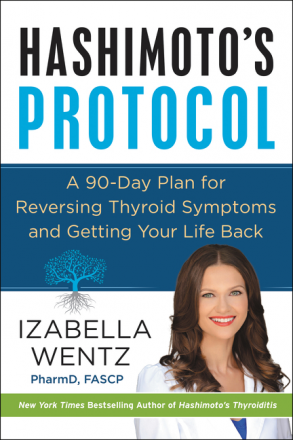
Get the latest episode delivered straight to your inbox…
Hey, Thyroid Thrivers, Warriors and Survivors!
In Episode 89, we once again talk with special guest, Dr. Izabella Wentz, founder of www.ThyroidPharmacist.com and the author of the phenomenal New York Times bestseller Hashimoto’s Thyroiditis. She returns with a long-awaited, groundbreaking prescription to reverse the symptoms of this serious autoimmune condition, which is becoming one of the country’s fastest growing diseases.
We discuss, in this order:
-
- Inspiration for Hashimoto’s Protocol
- The link between the liver, toxins, supplements and the thyroid
- Chemical sensitivity
- How important is liver support when treating Hashimoto’s
- The difference between “detox” and “liver support”
- How common is Hashimoto’s?
- What are the symptoms?
- Testing and important tests
- What is the conventional approach vs. functional
- Root causes
- How can you accelerate healing and symptom reduction within one to two weeks, even for people who have been suffering for years? How do you do that?
In Brief:
- Hashimoto’s Protocol was inspired by a patient. (11:00)
- She wanted to figure out how to help more people feel better faster. (14:00)
- People were reacting to supplements because they weren’t metabolizing them properly. They needed liver support. People on liver support for 2 weeks felt much better. (14:40)
- Liver’s role in hypo: It is often overlooked. Primary role of liver is to activate things and get rid of things. There are different pathways that the liver takes. When we have lots of inflammation and toxins, the liver pathways get backlogged. The liver enzymes that carry out different toxins get “backlogged”. This is often overlooked. T4 to T3 conversion – a lot happens in the liver. People with hypo don’t sweat so those toxins aren’t leaving the body. Leaky gut also causes toxins to build up. This leads to a perfect storm situation, which causes thyroid problems. (20:00)
- Multiple chemical sensitivity. (24:00)
- Many stages of Hashimoto’s. Hashi’s manifest for years without being diagnosed. Having one autoimmune disease makes getting other autoimmune diseases more likely. (36:00)
- In conventional medicine, Hashimoto’s is still considered a rare condition. (38:00)
- Women have 5 to 8 times more thyroid disease than men. Women develop thyroid disease more commonly than men. (50:00)
- Women with thyroid issues have more problems getting pregnant, and this is because our body is in tune with the fact that the body is not a “safe” environment (maybe nutrient deficiency). (51:00)
- Selenium. People with thyroid disease are usually Selenium deficient. 200 to 400 micrograms is a safe dose. Helps reduce antibodies, hair growth, T4 to T3 conversion, preventing postpartum thyroid issues. Magnesium is also helpful. Thiamine (600 milligrams per day can resolve thyroid fatigue). (55:30)
- People with liver problems can keep things in their bodies longer than those with normal liver function and this leads to problems within the body. (1:03:30)
- Breast implants can sometimes cause health problems. (1:07:00)
- Parasites / gut infection / yeast are often present in those who have trouble getting better. (1:11:40)
- Can Hashi’s be put into remission? This is definitely possible. But there is no cure. There are also protocols available to regenerate your thyroid. (1:20:00)
Get a copy of Hashimoto’s Protocol here.

Resources:
Thyroid Pharmacist
Thyroid Nation
PLEASE JOIN US!! Be sure to check out our Radio Show Facebook Group, Hashi’s & Graves. We share information and offer support to those that need it. Each week the upcoming guests are announced and showcased.
Listen LIVE every Wednesday at 12 pm EST & Subscribe on iTunes or Stitcher.
We’d LOVE a review. Check us out on iTunes and let us know what you think!
Please join Danna and Tiffany to lightheartedly, yet thoroughly, discuss thyroid disease with some of the most advanced and innovative physicians, educators, bloggers, thyroid thrivers and advocates available. Our mission is to ensure that no one ever goes undiagnosed and/or undertreated and that all are aware of the intricacies that involve living life to the fullest with thyroid disease. United and informed, we will change the awareness, perception, diagnosis and treatment of thyroid disease. United, we heal.




